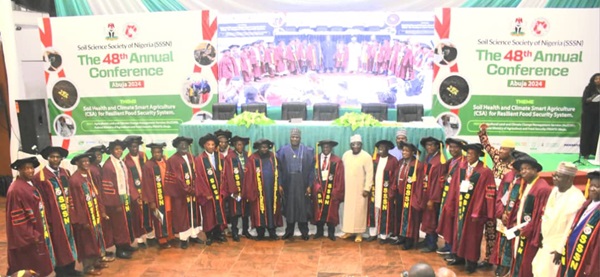
The Nigerian government has emphasised the need to prioritise soil health and climate-smart agriculture to bolster the nation’s food and nutrition security.
Minister of State for Agriculture and Food Security, Sen. Aliyu Abdullahi made this call at the 48th Annual Conference of the Soil Science Society of Nigeria (SSSN). The event, themed “Soil Health and Climate-Smart Agriculture for Resilient Food Security System,” was held at the National Centre for Women Development in Abuja.
Abdullahi highlighted that soil health and climate-smart agriculture are crucial for establishing a resilient food security system. He noted that soil health forms the foundation of sustainable agriculture, while climate-smart practices are essential for adapting to climate change.
“Addressing soil degradation and climate change is a fundamental challenge for sustainable agriculture,” Abdullahi stated. He added that climate change poses significant threats to arable land, citing President Bola Ahmed Tinubu’s speech at the 78th United Nations General Assembly (UNGA). In his speech, President Tinubu pointed out that Northern Nigeria is experiencing desert encroachment, the south is facing coastal flooding and erosion, and the Middle Belt is dealing with floods during the rainy season.
The minister emphasised the need for new knowledge, innovations, skills, techniques, technology, and value orientation to tackle these challenges. He stated that solutions include climate-smart practices such as conservation tillage, cover cropping, agroforestry, reforestation, cultivating climate-resilient crops and livestock and integrated pest and nutrient management.
Also, Abdullahi revealed that the ministry is promoting the Nigeria Farmers’ Soil Health Card Scheme (NFSHCS) as a key intervention for sustainable agriculture. The NFSHCS aims to improve soil health and fertility, increase agricultural productivity and resilience, enhance food security and nutrition, reduce greenhouse gas emissions and carbon sequestration and improve livelihoods and incomes for small-scale farmers.
He called for strong collaboration and synergy to support the success of this initiative, noting that a resilient food security system would benefit everyone.
In his opening remarks, director of agricultural land and climate change management services department, Mr. Olanipekun Oshadiya stated that the conference’s purpose was to discuss various issues around soil health and climate change and their implications on agriculture, health and the social well-being of the citizenry. He emphasised the importance of soil health in stimulating sustainable productivity growth in the agricultural sector and achieving the conference’s objectives and aspirations.
President of the Soil Science Society of Nigeria (SSSN), Prof. Jibrin Mohammed Jibrin described the conference as a landmark event, noting that it was the first time in a long while that the SSSN was coming together as a society. He acknowledged the Ministry’s role in organising the conference and discussing soil-related issues. He also praised the ministry for inaugurating the soil health card scheme for sustainable agriculture, which promotes site-specific and crop-specific sustainable soil health management practices, along with the careful application of fertilisers.
A statement from the ministry’s director of information, Mrs. Anthonia Eremah highlighted the event’s proceedings, including the presentation of a plaque to the minister.
The conference saw participation from representatives of the World Bank, Agro-climatic Resilience in Semi-Arid Landscapes (Acresal), OCP Africa, Food and Agriculture Organisation (FAO), Indorama and Soil Values, among others.
The government’s advocacy for prioritizing soil health and climate-smart agriculture underscores the urgent need to address the challenges posed by climate change and soil degradation. With strong collaboration and innovative practices, Nigeria aims to achieve a resilient and sustainable food security system.


